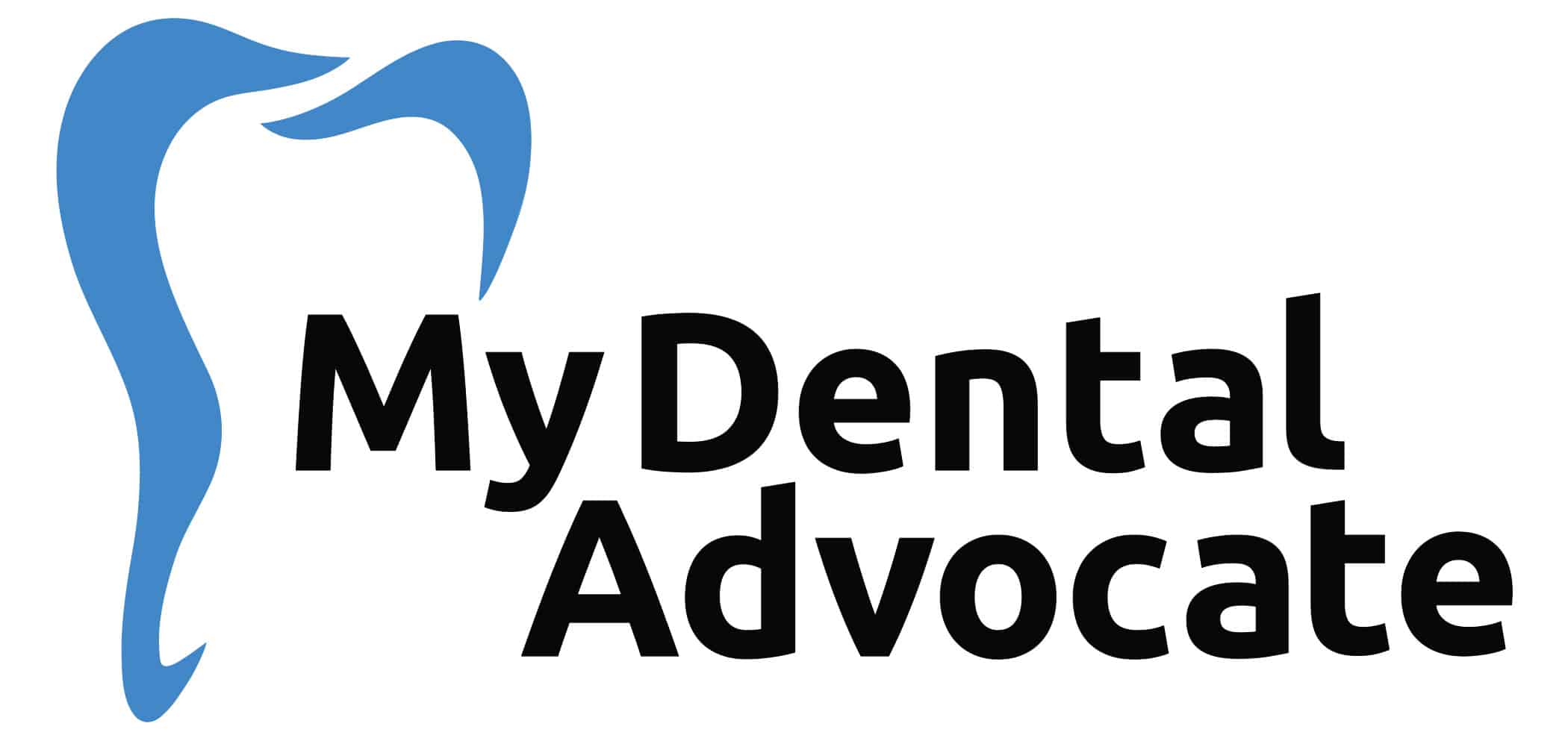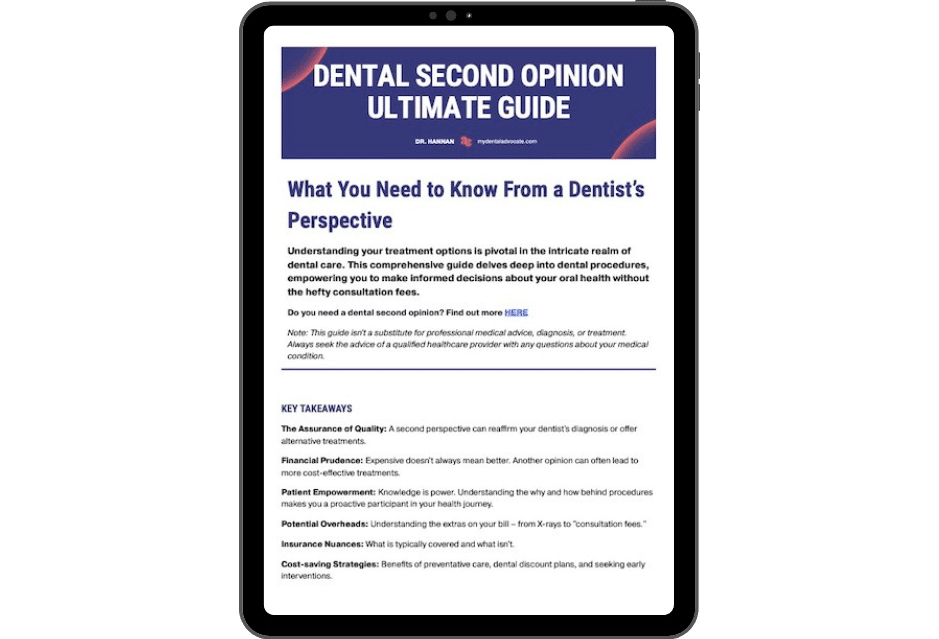7 Symptoms of Perforated Sinus After Dental Implant
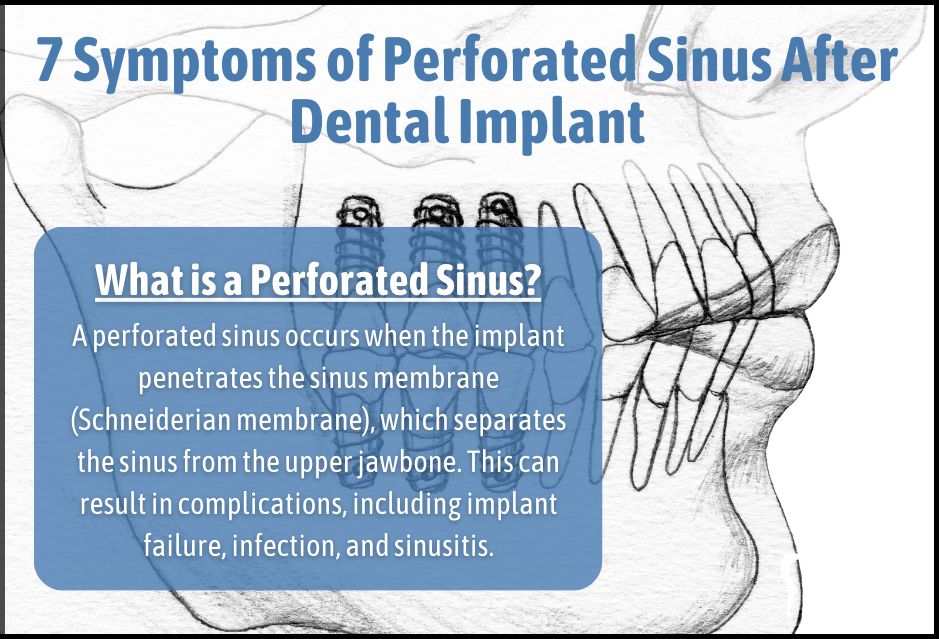
Dental implants are a popular solution for those seeking a lasting smile.
Though complications are rare, it’s essential to stay informed about potential risks, such as sinus perforation.
This minor concern is treatable, but knowing the symptoms is critical for a swift recovery.
Recommended Reading: Dental Implants | The Ultimate GuideNeed Dental Advice? Ask Dr. Hannan!
What Is a Perforated Sinus?
When you undergo a dental implant procedure, there is a risk that the oral surgeon may perforate your sinus cavity.
A perforated sinus occurs when the implant penetrates the sinus membrane (Schneiderian membrane), which separates the sinus from the upper jawbone. This can result in complications, including implant failure, infection, and sinusitis.
A recent study has shown that perforation of the Schneiderian membrane does not cause harmful long-term effects on sinus bone grafts and dental implants.
If you notice tenderness, swelling, or nasal issues after your dental implant surgery, don’t panic. Instead, contact your oral surgeon or dentist, as prompt treatment can resolve the problem effectively.
Embrace the benefits of dental implants while staying vigilant and proactive about your recovery. Let’s take a closer look from a dentist’s perspective.
Common Symptoms
- Pain or tenderness in the upper jaw area: Discomfort around the dental implant site, specifically near the sinuses, can be a sign of sinus perforation.
- Swelling around the cheeks, eyes, or forehead: Inflammation in these areas might indicate a sinus issue after dental implant surgery.
- Green or yellow nasal mucus: Thick, discolored mucus could signal a sinus infection or inflammation due to sinus perforation.
- Nasal congestion or blockage: Difficulty breathing through the nose or persistent stuffiness might be a symptom of sinus perforation.
- Reduced sense of smell: A diminished ability to detect odors can be associated with sinus issues, including perforation after dental implant surgery.
- Persistent sinus headaches: Ongoing headaches, particularly in the forehead or facial area, could be a sign of sinus perforation.
- Fever: A low-grade fever may accompany other symptoms if a sinus infection develops due to a perforated sinus after dental implant surgery.
It is important to note that some patients may not experience symptoms, so routine follow-up appointments with your oral surgeon are crucial after a dental implant procedure.
If you suspect a perforated sinus, it is essential to seek medical attention immediately. Delaying treatment can result in further complications, including implant failure and infection.
Causes of Perforated Sinus After Dental Implant
When it comes to dental implant surgery, there is always a risk of complications. One such complication is a perforated sinus. This occurs when the implant enters the sinus cavity during the procedure. Key factors include:
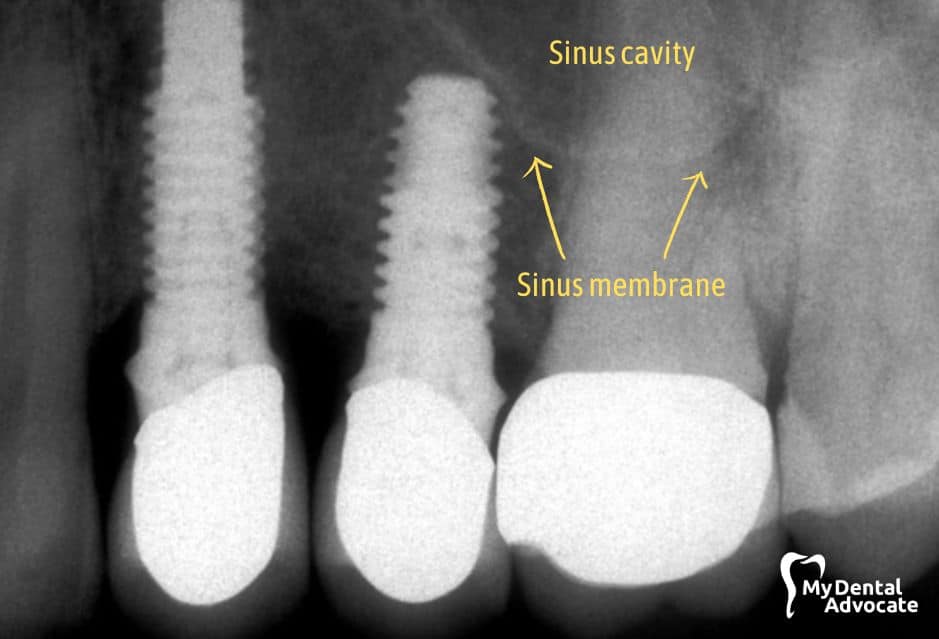
Surgical Complication
One of the most common causes is inadequate bone support. If the jawbone does not correctly support the implant, it can protrude into the sinus cavity.
This can happen if the surgeon does not accurately evaluate the amount of bone available or if they do not use the proper bone grafting techniques.
Another surgical factor that can cause a perforated sinus is improper implant placement. The implant can easily penetrate the membrane if placed too close to the sinus cavity.
This can happen if the surgeon does not have enough experience or if they do not use the proper tools and techniques.
Recommended Reading: Who is Not Suitable for Dental Implants? (Dentist’s Perspective)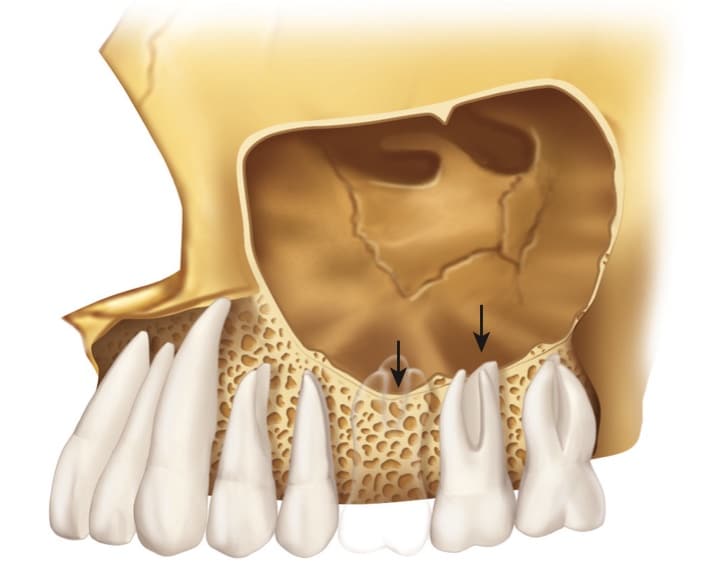
Anatomical Factors
In addition to surgical factors, there are also anatomical factors that can contribute to a perforated sinus.
One such factor is the shape and size of the sinus cavity. If the cavity is too large or too close to the implant site, it can increase the risk of perforation.
Another anatomical factor is the thickness of the sinus membrane. If the membrane is thin or weak, it can easily be punctured during the implant procedure. This can happen due to genetics or other medical conditions.
It is important to note that not all perforations are caused by surgical or anatomical factors.
Sometimes, it can be a combination of both or simply bad luck. However, by understanding the potential causes, you can take steps to reduce your risk of complications during dental implant surgery.
Recommended Reading: Can Dental Implants Get Infected? (Common Signs & Symptoms)Diagnosis of Perforated Sinus After Dental Implant
If you have recently undergone a dental implant procedure, you may be concerned about the possibility of sinus perforation. Although this complication is relatively rare, it can occur during implant placement, leading to pain, discomfort, and other symptoms.
Your oral surgeon typically uses a combination of X-rays and a physical examination to diagnose a perforated sinus after a dental implant properly.
X-Rays
X-rays are critical for diagnosing a perforated sinus after a dental implant procedure. Your surgeon will likely use a combination of panoramic and periapical X-rays to assess the placement of the implant and determine if it has penetrated the sinus cavity.
In addition to X-rays, your surgeon will consider your symptoms when diagnosing a perforated sinus after a dental implant. Some other common symptoms of a perforated sinus include:
Common Symptoms
- Pain or pressure in the sinus area
- Difficulty breathing through your nose
- Nasal congestion or discharge
- Headaches or facial pain
- A foul taste or smell in your mouth
If you are experiencing any of these symptoms after a dental implant procedure, it is essential to seek medical attention immediately. Prompt diagnosis and treatment can help prevent further complications and ensure a successful outcome.
Remember, a perforated sinus after a dental implant is a rare complication, but it can occur. By working with a qualified oral surgeon and following all post-operative instructions, you can minimize your risk of complications and enjoy a successful outcome.
According to a study, the overall survival rate of dental implants exposed to the sinus cavity was 95.6%, without significant differences based on the penetration level.
Treatment of Perforated Sinus After Dental Implant
You may wonder about your treatment options if you have experienced a perforated sinus after a dental implant. Depending on the severity of the perforation and any resulting infections, there are several treatments that your oral surgeon or implant dentist may recommend.
Antibiotics
If an infection has developed due to the perforation, your surgeon may prescribe antibiotics to help clear it up.
However, taking the entire course of antibiotics as prescribed is crucial, even if you start feeling better before the medication is finished. Failure to complete the whole course of antibiotics can lead to the development of antibiotic-resistant bacteria.
Surgery
In some cases, surgery may be necessary to repair the perforation. During the procedure, your surgeon will make an incision in your gum tissue to access the implant and the perforated sinus cavity.
The implant will be removed, and the sinus cavity will be cleaned and repaired. Your surgeon may also place a bone graft in the area to help support the implant and promote osseointegration.
Bone Grafting
If the perforation has resulted in a loss of bone support in the jawbone, your surgeon may recommend a bone grafting procedure. This involves taking bone from another area of your body or using a synthetic bone substitute and placing it where the implant will be placed.
This helps to support the implant and promote stability and osseointegration.
It is important to note that not all perforations require treatment. In many cases, a small perforation may heal independently without any intervention.
However, suppose you are experiencing pain, swelling, or a sinus infection. In that case, seeking treatment as soon as possible is important to prevent complications such as implant failure.
In addition to the treatments outlined above, your surgeon may also recommend using a nasal spray such as Flonase to help reduce inflammation in the sinus cavity and promote healing.
As with any dental implant surgery, carefully following your surgeon’s post-operative instructions is important to ensure the best possible outcome.
Prevention of Perforated Sinus After Dental Implant
Taking measures to prevent sinus perforation is crucial when getting a dental implant. A perforation can lead to complications such as infection and implant failure. Here are some tips to avoid sinus perforation during dental implant surgery:
Recommended Reading: 12 Best Dental Implant Brands 2024 (Dentist’s Perspective)Choose an Experienced Implant Surgeon
Selecting a skilled and experienced implant surgeon is essential to reducing the risk of sinus perforation. A qualified oral surgeon or periodontist will have the knowledge and expertise to avoid damaging the sinus cavity during surgery.
Take the time to research potential surgeons and choose one with a high implant success rate and positive patient reviews.
Use Imaging Technology
Utilizing imaging technology such as CT scans and 3D imaging can help the surgeon accurately assess the location of the sinus cavity and plan the implant placement accordingly. This can reduce the risk of accidental perforation during surgery.
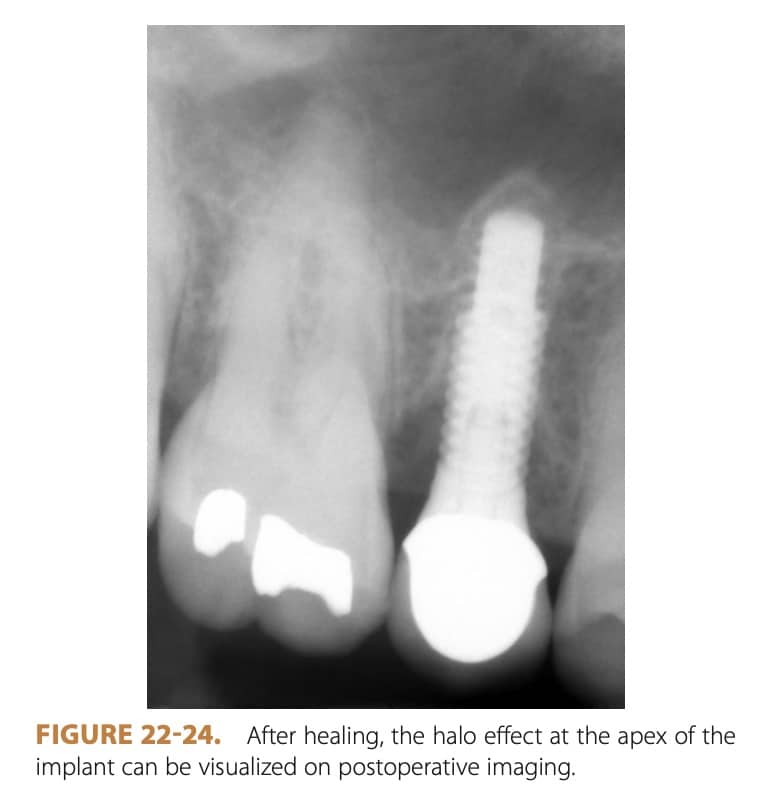
Consider a Sinus Lift Procedure
Your surgeon may recommend a sinus lift procedure if you have insufficient bone density to support the implant.
This involves lifting the sinus membrane and adding bone graft material to create a stable base for the implant. In addition, a sinus lift can reduce the risk of perforation during implant placement.
Communicate with Your Surgeon
Communicating with your implant surgeon about any concerns or questions would be best. Your surgeon should explain the procedure, including the risks and potential complications, and answer any questions you may have.
Contact your surgeon immediately if you experience discomfort or unusual symptoms after surgery.
Following these tips can reduce the risk of sinus perforation during dental implant surgery. Choosing an experienced surgeon, utilizing imaging technology, considering a sinus lift procedure, and communicating with your surgeon can help ensure a successful implant placement and reduce the risk of complications.
Frequently Asked Questions (FAQ)
What are the symptoms of a perforated sinus after dental implant surgery?
Symptoms include pain, swelling, or pressure in the upper jaw area, nasal congestion, green or yellow nasal mucus, and a reduced sense of smell.
How can I prevent sinus perforation during dental implant surgery?
Choose a qualified and experienced dental professional for the procedure and ensure they conduct proper preoperative assessments like CT scans or X-rays.
What is the treatment for a perforated sinus after dental implant surgery?
Treatment may involve antibiotics for infection, pain relief medication, and potentially surgical intervention to repair the sinus membrane and adjust the implant.
My Experience & Expertise
As a general dentist, I’ve observed various complications, including the rare perforated sinus. This occurs when the implant is placed too close to the sinus cavity, creating a hole in the sinus wall.
If you experience pain, swelling, or pressure in the upper jaw area after your procedure, seek medical attention immediately to prevent severe complications like infection, sinusitis, or meningitis.
To minimize risks, choose a qualified and experienced dental professional for your implant procedure and follow all post-operative instructions, such as avoiding strenuous activity, smoking, and drinking alcohol for a set period.
In addition, attend all follow-up appointments to ensure proper healing. By taking these precautions and remaining vigilant about potential symptoms, you can enjoy a safe and successful dental implant experience.
Need a second opinion? We can help! Learn more. Knowledge is power when cultivating healthy dental habits. The more informed you are, the better positioned you’ll be to prevent avoidable and potentially costly dental procedures for you and your family. Watch for future blog posts, where we’ll continue sharing important information, product reviews and practical advice!
Sources
- Oh, E. Effect of Sinus Membrane Perforation on Dental Implant Integration: A Retrospective Study on 128 Patients. Implant Dentistry. 2011.
- Ragucci GM. Influence of exposing dental implants into the sinus cavity on survival and complications rate: a systematic review. Int J Implant Dent. 2019.

About the Author
Dr. Matthew Hannan, also known as “Dr. Advocate,” is a board-certified dentist on a mission to provide accurate dental patient education. He attended Baylor University before completing dental school at UT Health San Antonio School of Dentistry. He now lives in Arizona with his beautiful wife and 4 kids. Dr. Hannan believes everyone should access easy-to-read dental resources with relevant, up-to-date dental research and insight to improve their oral health.

Connect with Dr. Hannan!
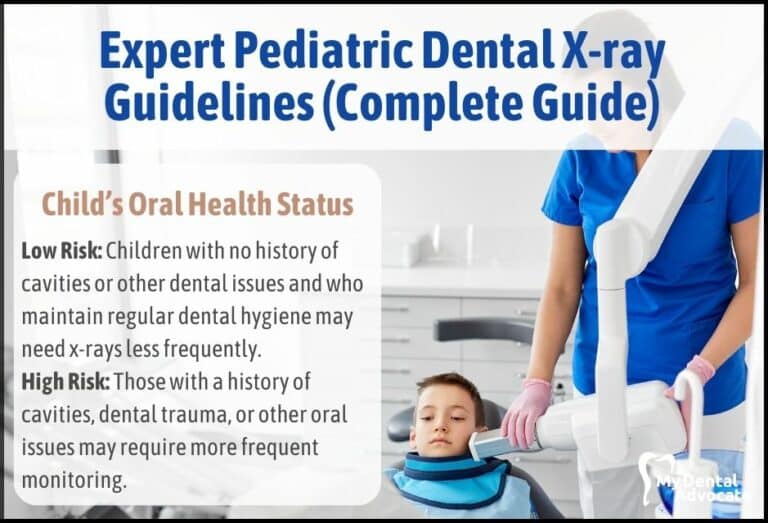
Expert Pediatric Dental X-ray Guidelines (Complete Guide)
Every parent wants what’s best for their child, especially their health. But dental visits can bring up questions, especially around the topic of x-rays. Are they safe? How often are they needed? What’s the real purpose behind them?
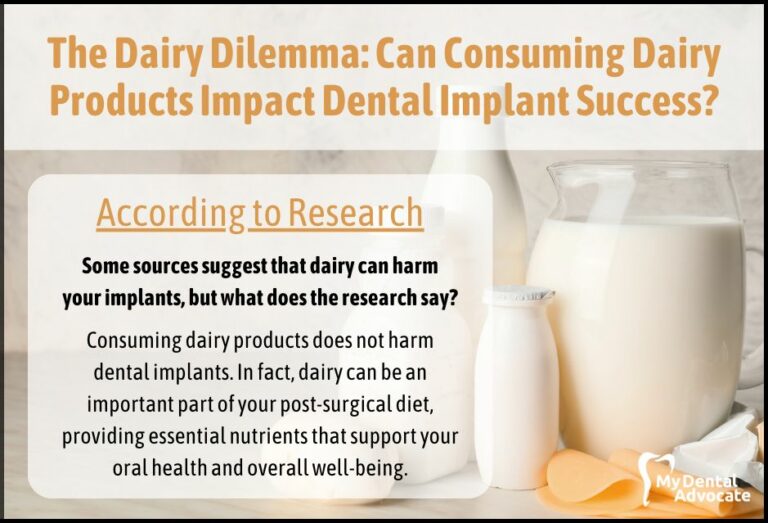
The Dairy Dilemma (Can Consuming Dairy Products Impact Dental Implant Success?)
According to recent research, consuming dairy after dental implants can be highly beneficial for your oral health. So, let’s dive in and discover how dairy can support your dental implant success from a dentist’s perspective…

Does Fluoride During Pregnancy Affect Child’s IQ?
As a dentist, I’m often asked about the safety and effectiveness of fluoride use during pregnancy. Recent research has explored the potential link between fluoride exposure during pregnancy and its effect on a child’s IQ…
Gain Clarity with Our FREE Second Opinion Guide
Receive clear, expert second opinions online within 48 hours. Start today!
Product Reviews
Our 250+ dental product reviews (and counting), curated by an experienced dentist, are the most comprehensive online.
Toothbrush Genie
State-of-the-art chatbot designed to help you discover your perfect toothbrush in just a few simple steps!
Cavity Risk Assessment
Cutting-edge digital tool designed to evaluate your individual cavity risk based on your responses to a series of questions.
Gum Disease Assessment
Discover your gum disease risk with our quick and engaging 6-question assessment!
